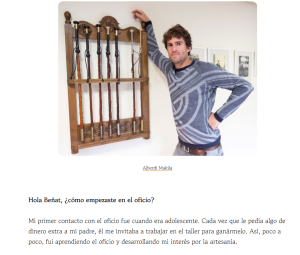
Interview for Be Glu Magazine. Basque makila: the artisanal legacy of the Alberdi family
Beñat Alberdi: Third Generation of Basque Makila Artisans
The makila is not just a simple walking stick: it is a symbol deeply rooted in Basque identity. Traditionally used for support while walking and as a means of defense, the Basque makila has evolved into a ceremonial object filled with respect, hierarchy, and cultural pride.
Its handcrafted production requires patience, knowledge, and a craft passed down from generation to generation. Each makila is unique, and its production process can take up to a decade, from selecting the medlar wood to assembling its finest details.
In a recent interview with Alberdi Makila – Be Glu Magazine, Beñat Alberdi —third-generation artisan alongside his sister Saioa— shared his story, his vision for the future of craftsmanship, and the legacy of the Alberdi family.
Beñat Alberdi’s Beginnings in Basque Craftsmanship
Beñat’s first contact with the makila was during his adolescence, helping in the family workshop. What began as a way to contribute gradually became a vocation. Today, he leads the workshop alongside his sister Saioa, keeping the tradition of handcrafted Basque makilas alive.
The Crafting Process of the Makila
Wood Selection
It all begins in the forest, where in spring the branches of wild medlar are marked to create the characteristic reliefs of each makila. The wood is cut in winter, debarked, straightened with heat, and left to dry for years, sometimes up to a decade.
Metal and Leather Work
Once the wood is ready, a brass, nickel silver, or silver ferrule is added, hand-chiseled with Basque motifs. Finally, the handle is crafted from horn and hand-braided leather. For honorary makilas, the finish is entirely in silver or nickel silver.
This meticulous process makes each piece a unique object full of symbolism.
The Makila as a Cultural Symbol of the Basque Country
The makila is rarely purchased for oneself; it is usually given as a gift of respect, recognition, and honor.
Inscriptions in Basque reinforce this symbolic value. Some of the most common are:
-
Hitza Hitz (“the word is the word”), reflecting the importance of keeping one’s word.
-
Nere bideko laguna (“my companion on the path”), often chosen for retirement or gratitude gifts.
Each order is unique, and each delivery carries emotion, history, and pride.
The Future of Basque Craftsmanship
Beñat Alberdi believes that craftsmanship will continue, though with fewer artisans. This exclusivity will make the craft closer to luxury, not only because of the quality of the pieces but also because of what they represent:
-
time,
-
expertise,
-
authenticity.
The makila thus becomes an object that transcends the material and connects with the history and spirit of the Basque people.
Inspiration and Life Beyond the Workshop
The sea and nature are constant sources of inspiration for Beñat. His passion for surfing and the outdoors connects him to the energy he conveys in his artisan work.
He also recognizes the importance of the digital world and artificial intelligence, tools that help spread tradition without losing its essence.
 A Legacy That Continues
A Legacy That Continues
For us, this interview has been an opportunity to show that the makila is much more than a walking stick: it is culture, tradition, and art. Each piece we create in our workshop is a living testimony of the Basque Country’s history and our family’s commitment to preserving it.
Want to learn more about our work or place a special order?
Contact us [here] or follow us on our social media to see life in the workshop.

